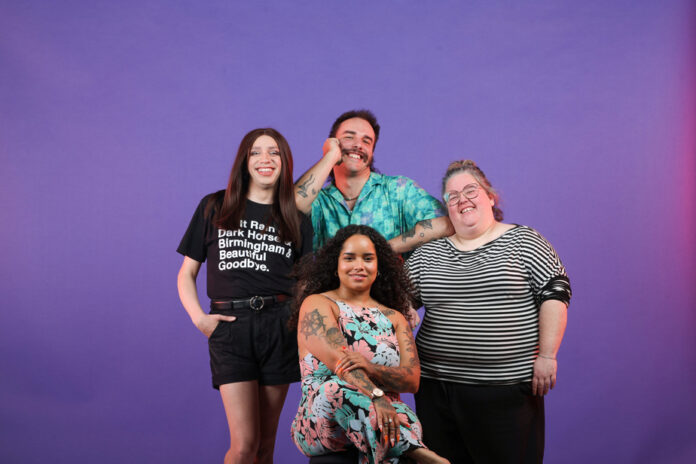Tranna – Queer pop culture. I often talk about transphobia and homophobia in funny ways. And I like to make fun of heteronormativity.
Erika – The reality of being a queer person from a Latino family and pansexuality, or being interested in someone beyond their gender.
Charlie – Gay parenting, because I have lesbian mothers. I find it funny to interfere in male-female relationships with the gaze of a gay man. I also like to talk about queer sexuality in a raw way, while remaining at the service of the joke.
Justine – I often talk about my girlfriend, my queer daily life, the fact that I would have been a bad hetero. Since I have a lot of heterosexual friends and often hear things about their sexuality that I find hard to believe, I like to laugh about it.
Charlie – It’s important to know how to laugh at yourself and at us as a community. I love laughing at how ridiculous gay men are sometimes, but always laughing at us because I love us. When I say I’m fif in an absolutely pejorative way, because that’s me and I look like I look, people understand and can laugh with me.
Justine – When we laugh at us, it gives people permission to laugh too. There is a difference between using our experience and hating ourselves through it.
Tranna – When I see comedians, often straights, go beyond the stage of self-mockery and hate themselves on stage publicly, it amazes me. Before going on stage, I had to find a love for me.
Erika – It takes a lot of self-confidence to go on stage and talk about your queer identity.
Justine – Often! I joke that I’m tired of being asked who’s the guy and who’s the girl with my girlfriend, before saying that I’m clearly the guy… It allows me to mock stereotypes and expectations in straight couples. The idea is not to have an accusatory tone.
Charlie – I have a number on how straight guys are pocketed to take dick pics. It takes the pressure off them when we talk about it. In humor, if an Italian comedian talks about his Italian family, you say to yourself, “I have a family, so I’ll understand. But when you talk about queer sexuality, straight people don’t tend to think, “Ah, I have a sexual orientation too.” For them, heterosexuality is the norm. You need to take them by the hand a little more. It pays off, because it surprises them.
Erika – I’ve said on stage before that if you’re straight guys, you’re in LGBTQ, because I can be into LGBTQ and everything. Pansexuality encompasses straight people, whether they like it or not. I am a queer person who may be interested in a straight cisgender man. They never think about it, but I like to include them. And then I can laugh at them.
Tranna – I’m not afraid to provoke them. In my opening, I often ask if there are any straight guys in the room. Generally, they do not identify themselves, because they are always a little afraid of trans people. I really like to make fun of that. And I joke about how happy I am to be at the point where straight men are afraid to identify themselves in public. With humor, I want to erase straight guys a bit the same way the world wants to erase us.
Tranna – Our humor is progressive and it reflects the current world. Most queer comedians offer something super clever. Last year, when I was rehearsing my gala number at Just for Laughs, I saw a straight American comedian, and I felt like I was in 1985. There was no evolution. Queer humor tackles topics that have not been talked about before and pushes the boundaries.
Justine – It’s more subversive. We are going to a little different tillers.
Charlie – After decades of TV shows with dramatic narratives, revolving around coming out and accepting parents, we finally have access to queer comedians in control, who talk about funny things, from their points of view and their references. Yes, sometimes we will talk about traumas, but as a joke. Before making my debut in comedy, I wondered if the world was ready to laugh with me and my super fif side, on which I absolutely do not want to concede anything. The answer is yes ! They laugh. I never felt any animosity. Not just in Montreal, but everywhere in Quebec.
Erika – It depends. If I do a show in a safe space, I don’t change anything, because I know that my world is following me. If I’m in an ultra-heteronormative line-up of comedians, I won’t change my humor, but I’ll take a little longer to get to the joke. It’s the same with ethnic humor when I’m out in the country: if I crack jokes about having immigrant parents or growing up in predominantly immigrant neighborhoods, and I’m in a place where that’s not a reality, I’m going to take a little detour to get to my joke.
Tranna – The industry always wants things to be of interest to everyone, but that can’t be. Niches are a good thing. Not everything is for everyone. When you get too general, nobody cares. It’s better to do things that will excite the world that comes to see you.
Charlie – There’s nothing like a queer audience that doesn’t know that humor can be for them too. It laughs like never before!
Justine – It’s the best audience, actually.
Erika – I like setting up a premise or making a punch seeing someone in the crowd nodding their head in approval because they recognized themselves. There is nothing better !















